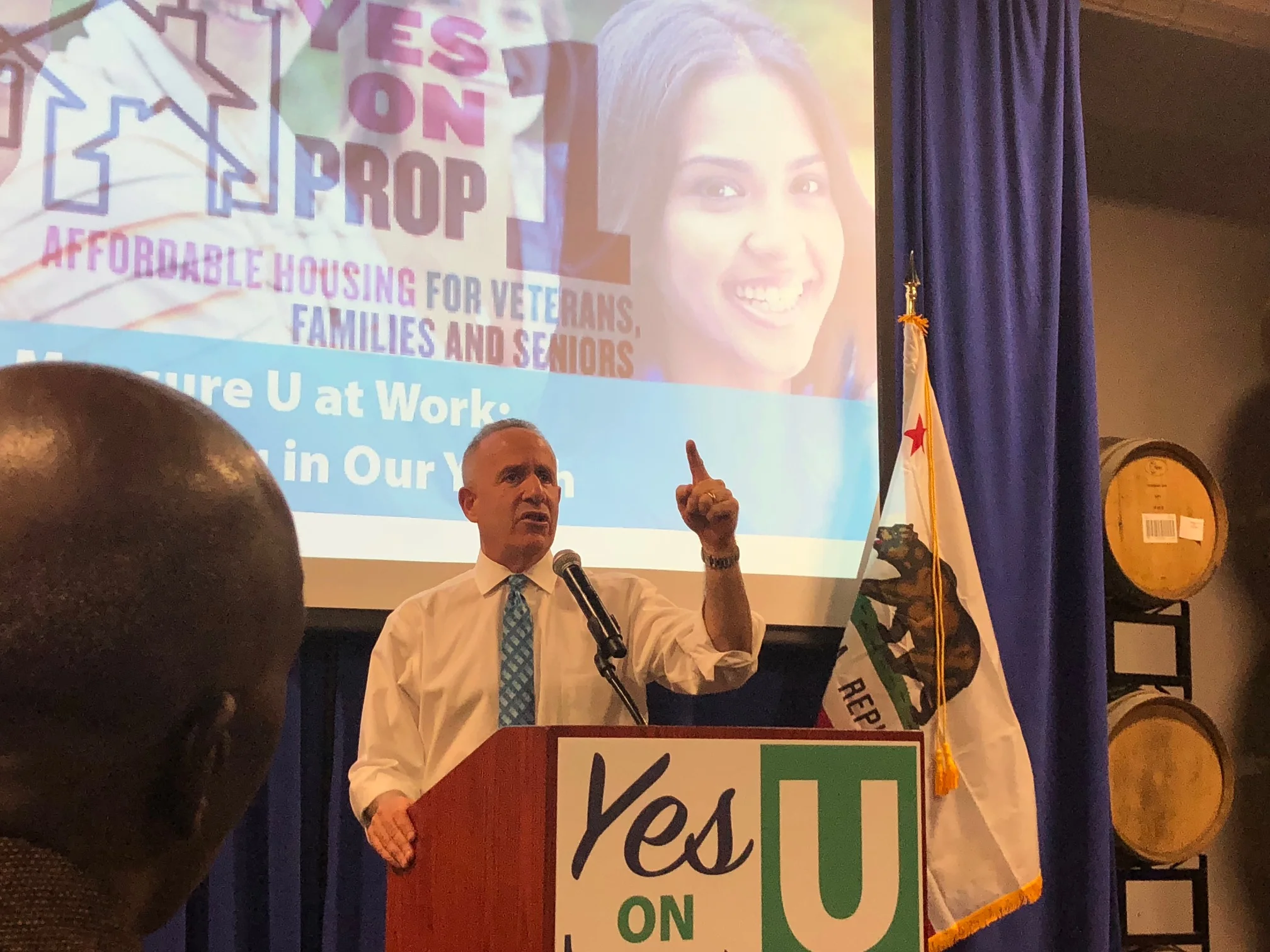Mayor, Councilmember Hansen announce plans to convert downtown’s Capitol Park Hotel to a shelter
Mayor Darrell Steinberg joined Councilmember Steve Hansen Thursday to announce plans to turn the Capitol Park Hotel on L Street into a temporary homeless shelter.
The City Council will vote Tuesday on whether to partner with the Sacramento Housing and Redevelopment Agency and Mercy Housing California to acquire the building at Ninth and L streets. The single-room-occupancy hotel, built in 1912, will be used by SHRA as a low-barrier homeless shelter for 18 months, after which it will be extensively renovated by Mercy into permanent supportive housing.
Capitol Park Hotel has 180 rooms, but half of them currently sit empty. The hotel’s owner is in contract to sell the building to Mercy Housing, which will work with a specialist to relocate the existing residents. The City plans to lease the building from Mercy and contract with SHRA to oversee its operation as a 180-bed shelter.
SHRA estimates this shelter could open in summer of 2019.
“Capitol Park Hotel provides an unusual opportunity to add shelter beds quickly and in a part of our city that desperately needs them,” Mayor Steinberg said. “Getting people off the streets in our downtown core will not only help them reclaim their lives, it will provide relief to downtown residents and businesses that are daily confronted with the health and safety impacts of large numbers of people living outdoors.”
Councilmember Steve Hansen said: “Across the city, we all have to chip in and do our part to make more shelter beds available for our city’s unsheltered residents, and I’m committed to meeting that need in District 4. Last year, Mercy Housing approached the City with the concept of a permanent supportive housing development at Capitol Park Hotel. This upcoming Tuesday, the Mayor & Council will have an opportunity to leverage this site sooner to provide a much needed low-barrier triage center to help those on the streets and reduce the impacts of the homeless on our neighborhood and businesses.”
Rick Sprague, Regional Vice President of Mercy Housing, said Mercy and SHRA are working together to obtain financing to renovate Capitol Park Hotel into 134 units of permanent housing, all with bathrooms and kitchens that many of the rooms now lack.
“While we are working to turn the Capitol Park Hotel into permanent supportive housing, we support the Sacramento City Council’s efforts to utilize it as a temporary shelter site for Sacramento’s homeless population,” Sprague said.
The City plans to lend Mercy $13 million for the purchase of the hotel from its Innovation and Growth Fund, which holds tax increment money that formerly would have gone to the redevelopment agency before the state did away with redevelopment. The money will be paid back to the City by Mercy when it completes its financing for the building’s conversion.
“Housing Sacramento’s homeless individuals is a complex issue that requires innovative solutions,” said La Shelle Dozier, Executive Director of Sacramento Housing and Redevelopment Agency. “SHRA is pleased to partner with the City to help move Sacramento closer to ending the housing crisis for those critically in need of shelter.”
Money to operate the shelter will come from $16 million in one-time Measure U reserves allocated by the City Council in February to address homelessness. This money is enough to fund the Capitol Park Hotel shelter for 18 months and the Lot P shelter planned for Ethan Way for two years.
It is also enough to cover two years’ worth of costs for 50 scattered-site shelter beds included in the plan going to City Council on Tuesday. This program will rely on community non-profits to lease single family homes in higher-income neighborhoods that lack the expanses of vacant land needed for larger facilities. Each home would house five residents and would be staffed by a monitor around the clock.
Scattered site shelters are ideal for special populations (such as the elderly, LGBTQ, single women, etc.) who may not feel comfortable in an open group facility. They can be created quickly and closed when the need no longer exists. It costs an estimated $115,000 a year to operate each home.
Mayor Steinberg expects to amass significantly more funding for shelters through the anticipated second round of HEAP funding in Gov. Gavin Newsom’s state budget. The city and county of Sacramento received $20 million from the state budget last year.
Mayor Steinberg also expects to raise at least $6.5 million privately.
Tuesday’s Council vote would also direct city staff to negotiate on specified shelter sites as funding becomes available. One of these is a piece of Caltrans land under Business 80 at the intersection of the Alhambra and W/X Corridor. This parcel, proposed by Councilmember Jay Schenirer, can accommodate a 100-bed low-barrier shelter, accompanying storage and an outdoor pet area. City staff estimates this shelter could open by spring 2020.
Council will also consider moving forward with an unspecified site in south Sacramento that will be identified within three weeks. This site would replace the previous proposal to build a shelter on a parking lot near the Florin light rail station.
Mayor Steinberg applauded his Council colleagues Thursday for moving quickly to find places to create shelter beds in the months since he called on each member to find space for 100 beds in their district. The City now has plans in the works for about 700 new shelter beds.
“Things are moving pretty fast; my colleagues are taking the challenge seriously,” Mayor Steinberg said. “I want to count beds, and the number of beds needs to represent a serious commitment to getting thousands of people off the streets.”
#######




